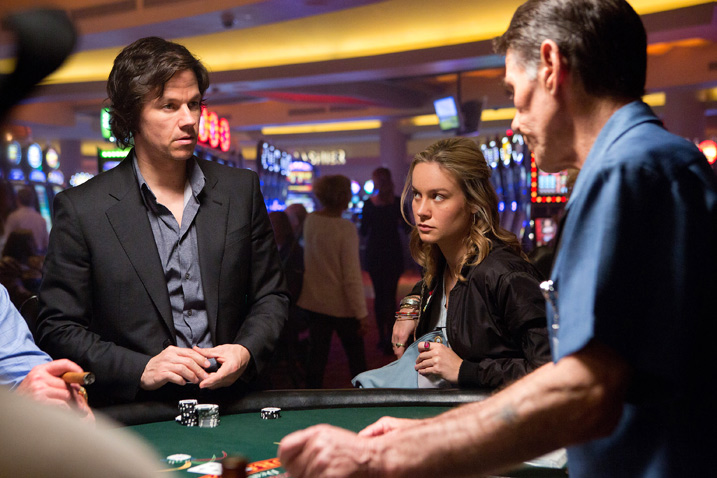 A mission matched to Mark Wahlberg’s on-screen roles means an intense optimism, an earnest resolve that one can easily visualize. Eyes wide, nostrils flared, an incredulous stutter – his face is a perfect slate on which to register stakes as they build. “The Gambler” sets that slate to zero and stages a man who knows the stakes and doesn’t care: $125,000 owed, seven days to pay, and Jim Bennett (Wahlberg), a college literature professor, liable to repeat the situation even if he clears his name.
A mission matched to Mark Wahlberg’s on-screen roles means an intense optimism, an earnest resolve that one can easily visualize. Eyes wide, nostrils flared, an incredulous stutter – his face is a perfect slate on which to register stakes as they build. “The Gambler” sets that slate to zero and stages a man who knows the stakes and doesn’t care: $125,000 owed, seven days to pay, and Jim Bennett (Wahlberg), a college literature professor, liable to repeat the situation even if he clears his name.
The film in which this premise unfolds intrigues by its director, or more specifically its director’s decision to tackle it: Rupert Wyatt (“The Escapist”), who previously handed 20th Century Fox a new franchise with “Rise of the Planet of the Apes.” Instead of turning to another big-budget tentpole, he’s used his studio clout on this, a remake of the 1974 New York-set drama starring James Caan and penned by James Toback.
Toback and Caan – those two names alone conjure a level of grit and seediness that the ‘70s Paramount output practiced in spades; the most disappointing aspect of the remake by Paramount now then is just how contemporary and neutered it feels. Relocated to Los Angeles, the film joins the trend of stylistic period choices as shorthand – the hope that when a cliché appears we’ll call it homage and leave it at that. But a genre exercise such as this needs invention, and while Wyatt trots out a slick stamp on proceedings with a game cast, his version never works up steam enough to render the effort worthwhile.
 The script is ground zero for evidence of that fact. Screenwriter William Monahan (“The Departed”) poses a challenge — how best to write a character who admits he’s sunk from the beginning and stays that way nearly throughout? — and chooses to frame it as a character study in futility. Wahlberg takes that cue and embraces it as Jim, carrying his slimmed-down, pale frame with a defeated silence coupled with sudden bursts of anxious energy.
The script is ground zero for evidence of that fact. Screenwriter William Monahan (“The Departed”) poses a challenge — how best to write a character who admits he’s sunk from the beginning and stays that way nearly throughout? — and chooses to frame it as a character study in futility. Wahlberg takes that cue and embraces it as Jim, carrying his slimmed-down, pale frame with a defeated silence coupled with sudden bursts of anxious energy.
In repeated scenes at a high-stakes blackjack table, Wyatt mounts the action in steady, alternating close-ups and medium shots of Wahlberg and the dealer. It proves one of the smarter moves on Wyatt’s part, as it lets Jon Brion’s atypically electronic, pulsing score –created with composer Theo Green — raise the tension while we scan Wahlberg’s face as the cards drop. Early on, Jim admits that he can only approach life as total victory or complete failure, and there’s some dark glee in watching Wahlberg extend himself further — Cormac McCarthy-style — into a deeper, violent hole.
It only digs so far, however. Monahan structures the story around the countdown for Jim to pay back a stable of villains, all of whom need quirk on quirk to cloak that they’re simply your standard profane, ideology-spouting thugs. John Goodman locates a caustic groove as a bald, strangely paternal loan shark, but really it’s Michael K. Williams who steals the show, selling his character Neville’s love of dancing and avocado farms to great effect.
 The pair regularly visits Jim, screaming and applying all kinds of brute force, but their threats remain threats straight to the end — all while Jim continues to borrow more money, much from his spurned mother (a brief, affecting Jessica Lange) and gamble away that cash as well. As a character choice for Wahlberg it’s amusingly nihilistic, but as audience motivation the interest wanes as penalties prove to carry little weight.
The pair regularly visits Jim, screaming and applying all kinds of brute force, but their threats remain threats straight to the end — all while Jim continues to borrow more money, much from his spurned mother (a brief, affecting Jessica Lange) and gamble away that cash as well. As a character choice for Wahlberg it’s amusingly nihilistic, but as audience motivation the interest wanes as penalties prove to carry little weight.
Similarly weightless is Brie Larson’s role in the film, one of her first on a mainstream studio level. Larson herself brings much wit and empathy to the part of Amy, a bright student of Jim’s who witnesses his gambling addiction early on and attempts to learn more. But Wyatt uses her as a target board for the film’s themes with Jim and then sidelines her abruptly, actually cooping her up in an apartment across town until she’s needed once more.
If just for the bizarre sequence where Wahlberg throws himself at henchmen while yelling in a Koreatown nail salon, “The Gambler” justifies its journey to a present day remake in Wyatt’s hands. It’s a flawed, well-shot throwback that feels swayed by studio interference, full of performances serving a script that limits their efforts to one-liners. But even when that one-liner comes from a teaching Wahlberg about his unique theory on Albert Camus’ “The Stranger,” the actor commits enough to a new shade of role for us to see where he travels with it. [C]






What if Michael K. Williams dated Michelle Williams?